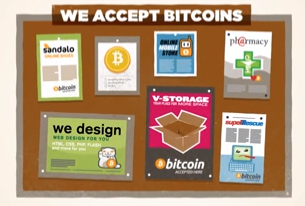Bitcoins are keeping homeless people fed


WIRED's Daniela Hernandez on Friday chronicled how some of Pensacola, Florida's displaced residents are forsaking panhandling and adopting the digital currency. One man named Jesse Angle earns spending "money" by watching YouTube videos, and the public Wi-Fi is free.
"For every video he watches, Angle gets 0.00004 Bitcoins, or about half a cent, thanks to a service, called BitcoinGet, that shamelessly drives artificial traffic to certain online clips. He can watch up to 12 videos a day, which gets him to about six cents. And he can beef up this daily take with Bitcoin Tapper, a mobile app that doles out about 0.000133 Bitcoins a day - a couple of pennies - if he just taps on a digital icon over and over again. Like the YouTube service, this app isn't exactly the height of internet sophistication - it seeks to capture your attention so it can show you ads - but for Angle, it's a good way to keep himself fed," WIRED wrote.
No bank or currency clearing house is involved, so the funds go directly to Angle's virtual wallet. They can then be used to buy goods or traded for other currencies. Angle has earned the equivalent of over US$500 over the past several months, WIRED said. This is all happening outside of the official monetary system.
Bitcoins have gained an underground reputation because the currency is decentralized, its value is constantly in flux, and it's sometimes used to evade taxation or by criminal elements to launder money. Bitcoins are also traded for legitimate goods and services, bought and invested. It also provides for donations to the homeless.
Germany now recognizes Bitcoin as a unit of account that can be taxed in private transactions. Commercial entities will require special permission to use it. The peer-to-peer nature of the currency might make taxing individuals very difficult and banning Bitcoin outright impossible. Music and videos are still shared this way despite the entertainment industry's best efforts and government action.
It's doubtful that tax collectors would care about 6 cents, or even a few hundred dollars, but Bitcoin is being called a potential tax haven. Its presence on the streets of Pensacola may be an outlier but is eye opening nonetheless (change...pun intended... from the bottom up). Could an unofficial currency be rising?
updated 10/23
(image credit: Youtube/ David Worthington, @nataliereed])
Related on SmartPlanet:
- Germany accepts Bitcoin as currency
- Bitcoin takes off in Berlin
This post was originally published on Smartplanet.com